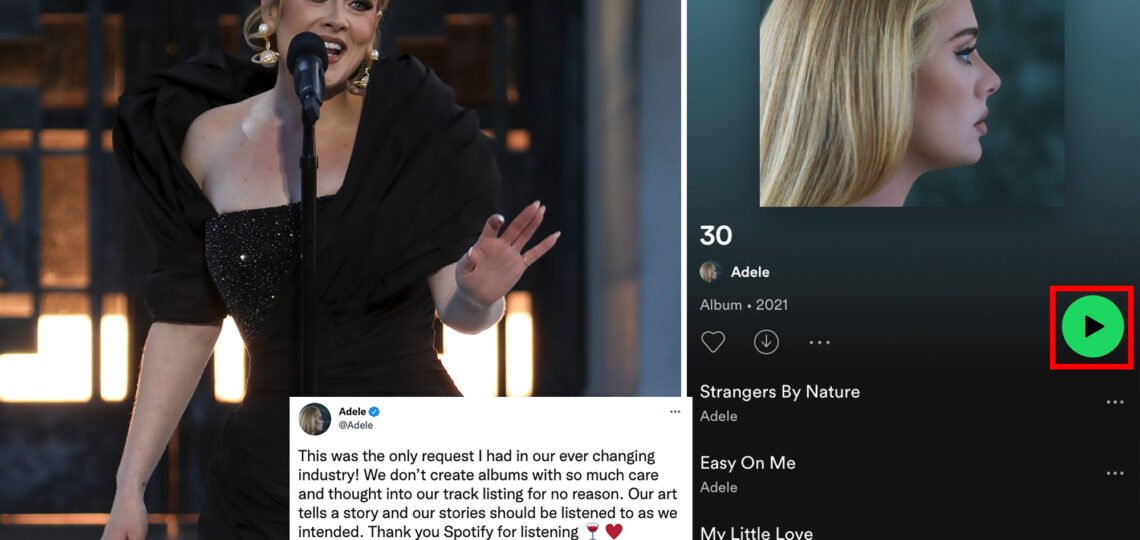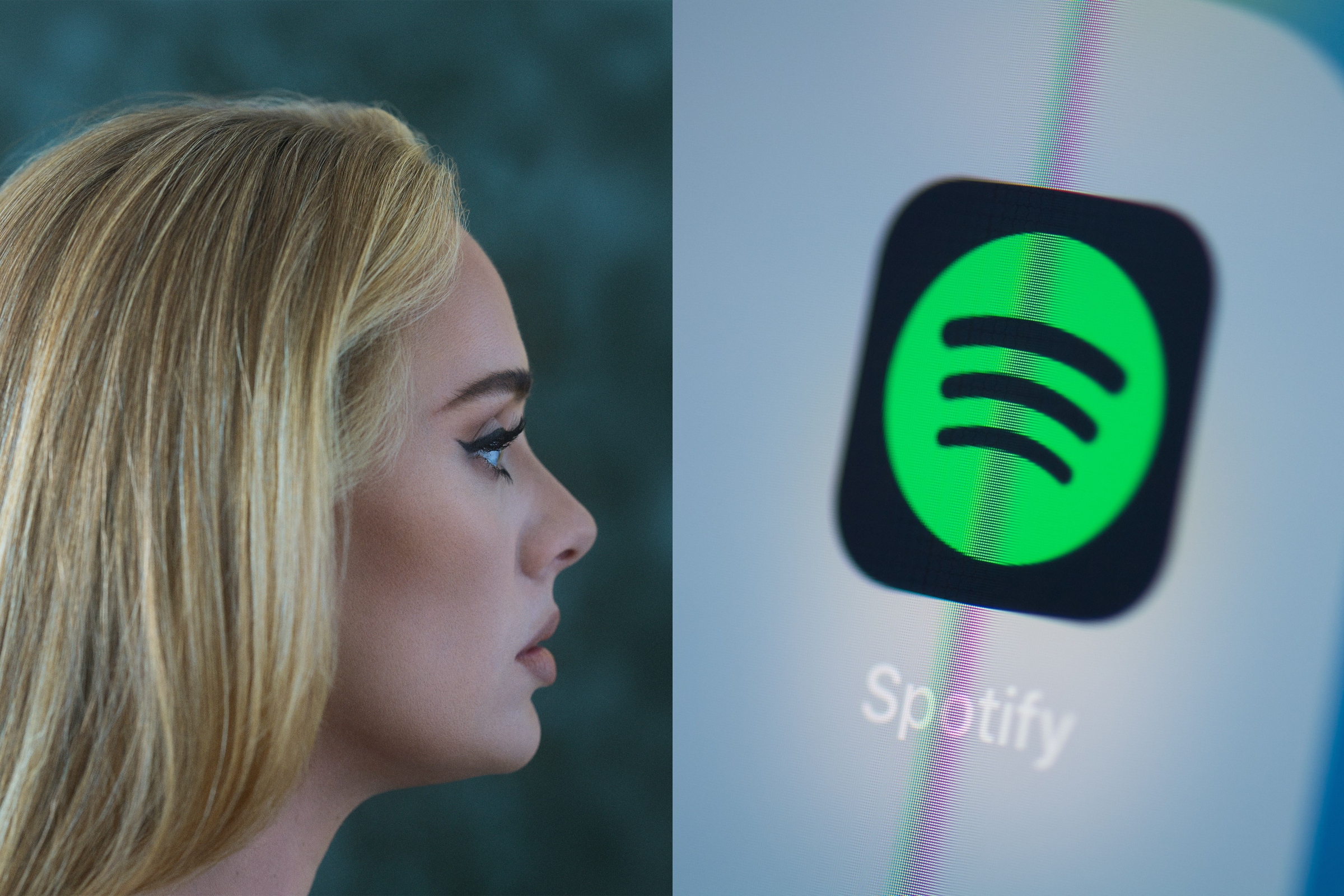
Adele Vs Spotify: The Battle Over Streaming Rights
Adele requested Spotify to remove the shuffle button from album pages. Spotify agreed, enhancing the album listening experience.
Adele’s influence extends beyond her music, impacting how we consume it. Her recent request to Spotify changed how users interact with albums. Instead of shuffling songs randomly, listeners now experience albums as intended by the artist. This move underscores the importance of artistic vision in music streaming.
Spotify‘s decision also highlights the platform’s willingness to accommodate artists’ preferences. This change benefits both artists and listeners, creating a more cohesive and immersive musical journey. The collaboration between Adele and Spotify reflects a shift towards prioritizing artistic integrity in the digital age. This development may inspire other artists to advocate for similar changes.

Adele’s Stance
In the music industry, Adele’s stance on Spotify has sparked interest. The singer-songwriter has been vocal about her views on streaming platforms. Let’s explore her position in detail.
Artistic Control
Adele values her artistic control over her music. She believes artists should have a say in how their work is shared. For Adele, this control means deciding when and where her music is available.
Streaming platforms often decide the order of songs in albums. Adele prefers fans to experience her albums in the intended sequence. She feels the album’s story should remain intact. This desire for control has led to some friction with Spotify.
Revenue Concerns
Adele has concerns about revenue from streaming services. Artists often receive a small fraction of the revenue. She believes this model undervalues the hard work of musicians.
Many artists, including Adele, feel their earnings from streaming are insufficient. They argue that traditional album sales provide better compensation. This issue is central to her stance on Spotify.
The following table highlights the difference in revenue between streaming and album sales:
| Revenue Source | Average Earnings per Unit |
|---|---|
| Streaming | $0.003 – $0.005 per stream |
| Album Sales | $10 – $15 per album |
These concerns over revenue and artistic control drive Adele’s stance on Spotify. She hopes to inspire change in the industry for the benefit of all artists.
Spotify’s Perspective
Adele’s recent stand against Spotify has sparked much debate. Let’s examine Spotify’s perspective on this matter.
Business Model
Spotify’s business model relies heavily on streaming. It offers free and premium subscription plans. The free plan includes ads, while the premium plan is ad-free. Spotify pays artists based on the number of streams. This model aims to attract a large user base and keep them engaged.
Spotify needs a vast music library to succeed. The platform aims to provide a wide variety of music. This helps in retaining users and attracting new ones. The more users Spotify has, the more revenue it generates. This is crucial for paying artists and covering operational costs.
User Experience
Spotify focuses on providing an excellent user experience. The platform uses algorithms to create personalized playlists. This helps users discover new music that matches their taste. Spotify also offers features like offline listening and high-quality audio. These features enhance the overall user experience.
Spotify’s interface is user-friendly. It allows users to easily search for songs, albums, and artists. The platform also supports social sharing. Users can share their favorite tracks and playlists with friends. This adds a social element to the music listening experience.
Impact On Fans
The clash between Adele and Spotify has sparked conversations across the globe. Fans are eager to understand how this impacts their music experience. Let’s explore the implications for fans in terms of accessibility and consumer choice.
Accessibility
Spotify offers a vast library of music. Fans can easily access millions of songs.
Adele’s stance on streaming services can limit this ease of access. Fans may find it harder to listen to her music on their preferred platform.
This situation forces fans to search for alternative ways to enjoy Adele’s music. Some may even purchase physical copies or download albums from other sources.
The accessibility debate also touches on how fans engage with music. Streaming services provide immediate access, while physical copies offer a different kind of experience.
Below is a comparison table showcasing the differences in accessibility:
| Spotify | Physical Copies |
|---|---|
| Instant access | Requires purchase and physical storage |
| Wide music library | Limited to owned albums |
| Subscription-based | One-time purchase |
Consumer Choice
Fans value the ability to choose how they consume music. Spotify’s model offers playlists, radio, and customized recommendations.
Adele’s music, if not available on Spotify, forces fans to make a choice. They must decide between staying on Spotify or exploring other platforms.
This situation impacts the fan experience. Fans love the convenience of streaming services, but they also want to support their favorite artists.
Here are some factors fans consider in their choice:
- Cost of accessing music
- Convenience of the platform
- Support for the artist
This dynamic creates a complex landscape for music fans. They must navigate between their preferences and their loyalty to artists like Adele.
Music Industry Reactions
The music industry has seen many debates. Adele vs Spotify is the latest. Artists and labels have mixed reactions. Let’s explore what they think.
Artist Support
Many artists back Adele’s decision. They believe in album integrity. Some say streaming can dilute an album’s experience.
- Ed Sheeran: Supports Adele’s stance.
- Taylor Swift: Feels artists should control their music.
- Billie Eilish: Agrees with preserving album flow.
Others see Spotify as a vital platform. They appreciate its reach. Drake and The Weeknd rely on streaming for success.
| Artist | Opinion |
|---|---|
| Ed Sheeran | Supports Adele |
| Taylor Swift | Control over music |
| Billie Eilish | Preserve album flow |
| Drake | Spotify is vital |
| The Weeknd | Relies on streaming |
Label Opinions
Labels have different views. Some support Adele’s choice. They value artistic integrity. Others see Spotify’s benefits. Streaming brings revenue and exposure.
- Columbia Records: Supports artistic decisions.
- Universal Music Group: Balances integrity and revenue.
- Sony Music: Embraces streaming’s reach.
Independent labels often side with artists. They appreciate album storytelling. Major labels have a broader perspective. Spotify partnerships are crucial for them.
| Label | Perspective |
|---|---|
| Columbia Records | Supports artistic decisions |
| Universal Music Group | Balances integrity and revenue |
| Sony Music | Embraces streaming |
Financial Implications
The financial implications of the Adele vs Spotify debate are significant. They affect both artists and streaming platforms. This section examines the monetary impacts, focusing on streaming revenue and sales trends.
Streaming Revenue
Streaming revenue is a major income source for artists today. Adele’s decision to withhold her album from Spotify raised questions. How much do artists earn from streaming?
| Streaming Platform | Revenue per Stream |
|---|---|
| Spotify | $0.003 to $0.005 |
| Apple Music | $0.007 to $0.01 |
Spotify pays artists between $0.003 to $0.005 per stream. Apple Music offers higher rates, from $0.007 to $0.01 per stream.
Adele might earn more by not streaming her album initially. This is because fans would buy it instead. Yet, the long-term streaming revenue could balance this out.
Sales Trends
Sales trends also play a critical role in financial implications. Adele’s albums traditionally sell millions of copies. She has broken numerous records.
- 21 – Over 31 million copies sold worldwide
- 25 – Over 22 million copies sold globally
Her decision to delay streaming could impact her sales trends. Fans eager for her music may purchase albums. This boosts immediate sales but might reduce long-term streaming income.
Streaming services, like Spotify, influence consumer behavior. They encourage more people to stream rather than buy music. This shift affects artists’ revenue streams significantly.
By understanding these financial aspects, stakeholders can make informed decisions. Artists need to balance immediate sales with long-term streaming revenue.
Legal Considerations
The clash between Adele and Spotify has brought legal issues to the forefront. Understanding these legal considerations helps us see the bigger picture. This section will delve into the specifics.
Copyright Laws
Copyright laws protect the rights of artists like Adele. These laws ensure that their work is not used without permission. In the music industry, copyright is crucial. It ensures that artists get paid for their work.
Spotify, as a streaming service, must respect these laws. They need to pay royalties to artists for every stream. Failing to do so can lead to legal issues. This is why understanding copyright laws is essential.
Here is a table showing key points:
| Aspect | Description |
|---|---|
| Copyright Protection | Protects the creator’s rights |
| Royalties | Payments for every stream |
| Legal Actions | Actions taken if laws are broken |
Contract Disputes
Contract disputes arise when parties disagree on terms. Adele’s contract with her record label is vital. This contract outlines how her music can be used and distributed.
Spotify must comply with these contract terms. Disputes happen if there is a misunderstanding or breach. Resolving these disputes often involves legal action.
Some common contract issues include:
- Royalty rates
- Exclusive rights
- Distribution terms
These disputes can impact the availability of music on platforms like Spotify. Understanding these legal considerations is key for both artists and streaming services.
Future Of Music Streaming
The future of music streaming is evolving rapidly. Artists like Adele have made bold moves against platforms like Spotify. This ongoing battle shapes the streaming landscape.
Emerging Platforms
New platforms are entering the market. They aim to change how we consume music. These platforms offer unique features and better artist compensation.
- Bandcamp: Supports independent artists.
- Tidal: High-fidelity sound quality.
- SoundCloud: User-generated content and indie artists.
Each platform provides a different experience. They cater to specific audiences and needs.
Industry Predictions
Experts predict significant changes in music streaming. Here are some key predictions:
| Prediction | Details |
|---|---|
| More Artist Control | Artists will have more say in how their music is distributed. |
| Increased Revenue | New models will improve artist earnings. |
| Better User Experience | Platforms will enhance user interfaces and features. |
These predictions highlight the industry’s potential growth. They underscore the importance of adapting to change.

/cdn.vox-cdn.com/uploads/chorus_image/image/64058272/1_whRPh_4RNjdIRXKvYFDFiw.0.1501102311.0.jpeg)
Conclusion
Adele’s stance on Spotify highlights the evolving music industry landscape. Both sides have valid points. The debate continues, reflecting broader issues in music distribution and artist rights. Fans and musicians alike watch closely as the industry adapts. Ultimately, the balance between artist control and platform convenience remains crucial.
